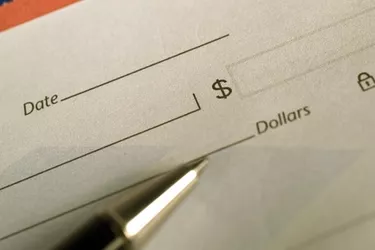
To stop payment on a check, a customer immediately calls the bank to begin the process. The customer then is required to send a written letter to the bank regarding the request and often the bank requests the reason for the order. The bank charges a substantial fee for this service and agrees to not pay the check if it comes to them for payment.
Defective Goods
Video of the Day
If a buyer realizes that goods are defective or are not equivalent to the items she thought she was buying, she may choose to stop payment on the check issued. This typically occurs when the buyer has no means of contacting the seller or the seller will not accept the return. Or, if a buyer makes a check out for a down payment on a vacation home that turns out to be a scam, he may choose to stop payment on that check. Stopping payment on a check remains in effect for six months from the time of order. If a person feels that the recipient of the check still may cash it after that period, another stop payment order must be obtained.
Video of the Day
Lost or Stolen Checks
According to Rocket Lawyer, a person who loses a check or has a check stolen may choose to place a stop payment order on that check. The cost involved with a stop payment order is less than what a person who finds the check may do with it. A person might also choose this option if she issued a replacement check to someone and wanted to stop payment on the original issued check. If an entire checkbook is stolen containing many checks, a customer should close the account immediately.
Insufficient Funds
A person may also choose to stop payment on a large check if he does not have the funds to cover the check. If a person writes a check and is expecting a deposit that does not come, his account will overdraw if the check clears. In this case the person not only must find money to cover the check, but he must also pay the insufficient funds charge the bank adds. This is considered check floating, which is an illegal act that is punishable by law.